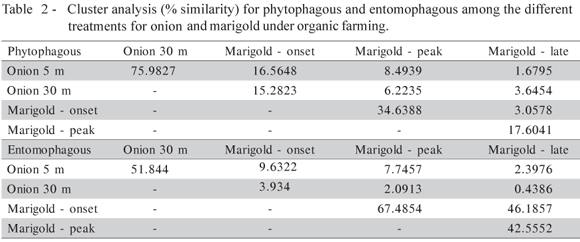Onion is the third most grown vegetable crop in São Paulo state, Brazil. Organic onion farming is expected to increase in the state due to the increasing demand. Pest management in organic onion farming is based on plant extracts with insecticide effects. However, the efficacy of such plant extracts has not been proved yet, and it was observed that they do negatively affect natural enemies. Plants surrounding onion fields, and that are attractive to natural enemies, may be a good option to farmers, since they may lead to increased diversity of arthropod species and, consequently, the natural control of pest populations. This study deals with the effect of marigold plants as a resource plant to natural enemies in onion fields. The experiment was set in a certified organic farm using marigold rows at a center of an onion field. Samples were taken from marigold and the onion plants 5 m (near) and 30 m (far) from the flowering strips. Higher numbers of arthropod pests were observed in onion plants 30 m from the marigold strip, while higher numbers of predators and parasitoids were found at 5 m distance. Species richness and Shannon's diversity index were higher at 5 m from marigold. Therefore, marigold rows next to onion fields resulted in higher number of entomophagous species, potentially enhancing the natural control of onion pests. In the study field, marigold strips may be an alternative to crop sprays for organic control of onion pests.
natural control; conservation; predator; parasitoid



